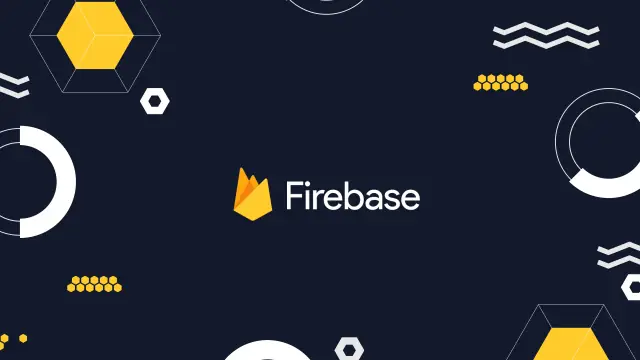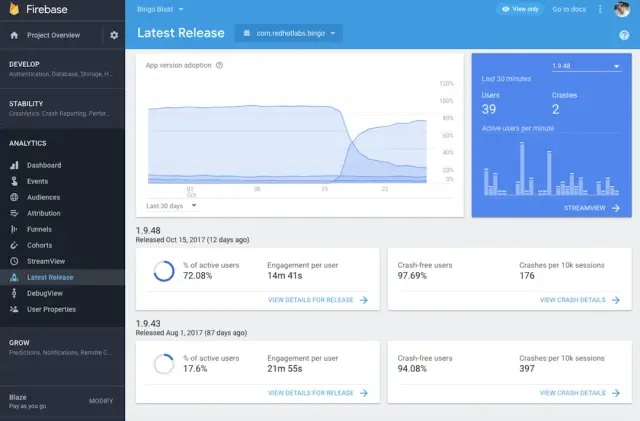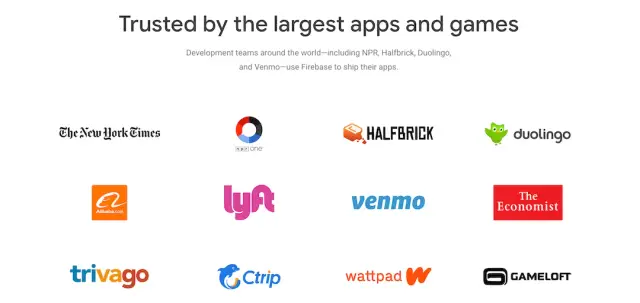What is Firebase?
Discover the power of Firebase, the comprehensive app development platform from Google. Learn what it is and how it can streamline your app development.

Firebase is a comprehensive app development platform from Google that has revolutionized the way developers build, deploy, and grow their apps. With its robust set of features, Firebase helps developers save time and effort by streamlining various aspects of app development. In this article, we will dive into the world of Firebase and explore what it is, its key features, and how it can benefit you in your app development journey. Whether you're a seasoned developer or just starting out, this article will give you a comprehensive understanding of Firebase and its capabilities. So, let's get started!
What is Firebase, and how it works?
Firebase is a comprehensive suite of tools and services offered as a Backend-as-a-Service (BaaS) platform, enabling developers to easily create, launch, and expand both mobile and web applications. It offers a real-time database, authentication, storage, hosting, and more features, and all managed from a single platform.
At its core, Firebase provides a real-time database that syncs data across all connected devices in real time. The database uses a NoSQL document-oriented data model, which allows developers to store data in a flexible and scalable manner. The data is stored in JSON format, and the database supports atomic transactions and real-time event notifications.
Firebase also offers robust authentication services, allowing developers to implement secure user authentication in their apps easily. It supports multiple authentication providers such as email/password, phone number, and popular third-party providers such as Google, Facebook, and Twitter.

In addition to its real-time database and authentication services, Firebase also provides cloud storage, allowing developers to store large files such as images and videos. The storage is integrated with the real-time database, providing a seamless experience for storing and retrieving data.
Firebase also provides a static hosting solution, allowing developers to host their web assets directly from the Firebase platform such as HTML, CSS, and JavaScript files. This makes deploying and scaling web apps easy without the need for complex server-side setup and configuration.
Finally, Firebase offers a suite of tools for analyzing app usage and performance, such as crash reporting, performance monitoring, and remote configuration. These tools provide valuable insights into app usage, helping developers to identify and resolve performance issues and improve the overall user experience.
Firebase provides a comprehensive platform for building, deploying, and growing high-quality mobile and web applications. Its real-time database, authentication services, cloud storage, hosting solution, and analytical tools make it a one-stop shop for app development, allowing developers to focus on building great apps for their users.
For all AppMaster users, we have provided an integration module with the Firebase service. Our users can install this module in their projects and call API methods from Firebase servers. They can use the authorization system using SMS two-factor authentication, as well as sending emails and working with the database inside the Firebase and other functions.
What type of apps can be developed with Firebase?
Firebase can be used to develop a wide variety of apps, including:
- Social Media Apps: Firebase's real-time database and authentication services make it an ideal platform for building social media apps, where users can connect and share content in real time.
- E-commerce Apps: Firebase provides a range of services that are essential for building e-commerce apps, such as real-time data synchronization, user authentication, and cloud storage for product images.
- Gaming Apps: Firebase's real-time database and analytical tools make it an ideal platform for building gaming apps, where users can compete and collaborate in real time.
- Messaging Apps: Firebase's real-time database and authentication services make it an ideal platform for building messaging apps where users can communicate and share content in real time.
- Location-Based Apps: Firebase provides real-time data synchronization and cloud storage services, making it an ideal platform for building location-based apps, where users can share their location and find nearby points of interest.
- Collaboration Apps: Firebase's real-time database and authentication services make it an ideal platform for building collaboration apps, where users can work together on projects and tasks in real-time.
- Utility Apps: Firebase provides a range of services that are essential for building utility apps, such as real-time data synchronization, user authentication, and cloud storage for storing user data.
These are just a few examples of the types of apps that can be developed with Firebase. With its comprehensive suite of tools and services, Firebase provides developers with everything they need to build high-quality apps for various platforms and use cases.
What is Firebase use cases?
Firebase can be used for a wide range of use cases, including:
- Real-Time Database: Firebase's real-time database provides a cloud-hosted NoSQL database that allows developers to store and retrieve data in real time, making it ideal for building real-time apps such as social media, gaming, and messaging apps.
- User Authentication: Firebase provides a robust user authentication system that supports multiple authentication methods, such as email/password, phone, and social media log in, making it ideal for building apps that require user accounts.
- Hosting: Firebase provides a hosting service that allows developers to deploy their web apps and static assets, making it easy to start web app development.
- Cloud Storage: Firebase provides a cloud storage service that allows developers to store and retrieve binary files, such as images and videos, making it ideal for building apps that require file storage.
- Analytics: Firebase provides a comprehensive platform that allows developers to track user behavior and usage patterns, making it ideal for building apps requiring analytics and insights.
- Machine Learning: Firebase provides a machine learning platform that allows developers to build and train custom machine learning models, making it ideal for building apps that require intelligent features such as image recognition and natural language processing.
- Remote Config: Firebase's Remote Config allows developers to dynamically control the behavior and appearance of their apps without requiring an app update, making it ideal for quickly experimenting with different app configurations.
These are just a few examples of the many use cases for Firebase. With its comprehensive suite of tools and services, Firebase provides developers with everything they need to build high-quality apps for various platforms and use cases.
Firebase Alternatives
Firebase is a popular backend-as-a-service (BaaS) platform, but several alternatives offer similar services for building web and mobile apps. AWS Amplify is a cloud-based platform from Amazon Web Services that provides real-time databases, user authentication, and hosting services. Parse is an open-source BaaS platform that offers a real-time database, user authentication, and cloud storage. Back4App is a cloud-based BaaS platform that provides similar services, including a real-time database and user authentication.
Heroku is a cloud-based platform that offers real-time databases, user authentication, and hosting services. MongoDB Atlas is a cloud-based database-as-a-service platform that provides a scalable and secure NoSQL database, user authentication, and cloud storage. When choosing a platform, developers should carefully evaluate the features and services of each platform to determine which one is best suited for their specific needs.
Popular apps using Firebase
Firebase has been adopted by many popular apps across various platforms, including iOS, Android, and the web. Here are some of the well-known apps that use Firebase:
- WhatsApp: The popular messaging app uses Firebase for real-time data synchronization and user authentication.
- Snapchat: The social media app leverages Firebase for real-time data synchronization and user authentication.
- Airbnb: The popular home-sharing app uses Firebase for real-time data synchronization and user authentication.
- Uber: The ride-hailing app utilizes Firebase for real-time data synchronization and user authentication.
- Instagram: The photo and video-sharing app uses Firebase for real-time data synchronization and user authentication.
- Twitter: The microblogging platform uses Firebase for real-time data synchronization and user authentication.
- SoundCloud: The popular music streaming app uses Firebase for real-time data synchronization and user authentication.
- Alibaba Group: The e-commerce giant uses Firebase for real-time data synchronization and user authentication.
- Shazam: The popular music recognition app uses Firebase for real-time data synchronization and user authentication.

These are just a few examples of the many popular apps that use Firebase. With its robust suite of tools and services, Firebase has become an essential tool for developers building high-quality apps across various platforms.
Firebase history
Firebase was founded in 2011 by Andrew Lee and James Tamplin and was originally developed as a real-time database for building mobile and web applications. The company was acquired by Google in 2014 and has since become an essential part of Google's mobile and web app development platform.
Firebase has undergone several updates and improvements since its acquisition by Google, adding new features and services such as cloud storage, hosting, machine learning, and more. In recent years, Firebase has become a popular choice for app development, with developers leveraging its robust suite of tools and services to build high-quality apps for various platforms, including iOS, Android, and the web.
The platform's focus on real-time data synchronization and seamless integration with other Google services has made it a popular choice for app developers, who appreciate its ease of use, scalability, and cost-effectiveness. With Firebase, developers can focus on building great user experiences without worrying about managing complex backend infrastructure.
Firebase has a rich history of innovation and evolution, starting as a real-time database for building mobile and web apps and evolving into a comprehensive app development platform. Its acquisition by Google has further strengthened its position as a leading player in the app development space. It continues to be an essential tool for developers building high-quality apps for various platforms.
Conclusion
In conclusion, Firebase is a comprehensive and powerful platform that provides services for building high-quality web and mobile apps. From its real-time database, user authentication, and hosting services to its many other essential features, Firebase offers everything developers need to create cutting-edge and highly functional apps. Whether you're a seasoned developer or just starting, Firebase is an excellent choice for building your next project. So why wait? Start exploring the power of Firebase today and take your app development to the next level!
FAQ
What is Firebase?
Firebase is a mobile and web application development platform that provides developers with various tools and services to build high-quality apps. It is a Backend-as-a-Service (BaaS) offering, meaning developers don't have to manage servers or infrastructure but can focus on building great user experiences.
What services does Firebase provide?
Firebase provides services for authentication, real-time databases, cloud storage, hosting, remote configuration, and analytics, among others. These services help developers create better and more scalable apps with less effort and time.
How does Firebase integrate with my app?
Firebase can be integrated with your app using the Firebase SDK, which is available for multiple platforms, including Android, iOS, and the web. The SDK provides APIs to access Firebase services and use them in your app.
Is Firebase free to use?
Firebase provides a free plan with limited usage and resources and also offers paid plans with more features and higher limits. The free plan is suitable for small-scale projects or for testing purposes, while the paid plans are designed for larger and more demanding projects.
How secure is my data in Firebase?
Firebase is designed with security in mind and follows industry data protection and privacy standards. To keep your data secure, Firebase provides various security features, such as authentication, access controls, and encryption.
What is the real-time database in Firebase?
The real-time database in Firebase is a NoSQL cloud database that allows for real-time data syncing across all connected devices. It enables developers to build collaborative and responsive apps by storing and synchronizing data in real time.
Can I use Firebase for server-side logic?
Firebase provides a cloud function service, which allows developers to run server-side code in response to events triggered by Firebase features, such as updates to the database or authentication events. You can use cloud functions for tasks such as sending notifications or triggering other actions.





